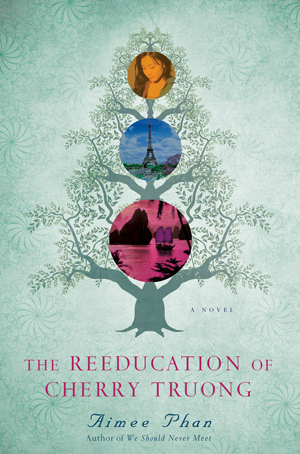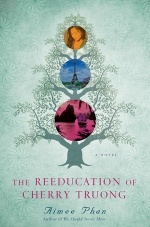Dear Readers: Thank you so much for stopping by to take in the Turning Points series here on distraction no. 99, in which I asked authors the question: What was your turning point as a writer? Today’s guest post is the last before I take a short hiatus at a writers colony—but the Turning Points series will return in May, with more inspiring guest posts from more wonderful writers, I promise.
In the meantime, I’d like to leave you with this Turning Point from Aimee Phan, in which she struggles in the face of the recession to find a good reason to keep writing…

When my then boyfriend and I left graduate school in our early twenties, all we wanted to do was write. We had no responsibilities but to take care of ourselves. Our parents were healthy and financially independent. My parents often lent me money during the lean months when my checking account was low. Although it took some convincing, my parents were willing to see me through this writing dream to see if I could actually make it work. Matt’s parents were even more encouraging and supportive of his ambitions to write poetry. Everything about our upper-middle-class suburban background had fooled us into believing that if we worked hard, we could have it all: literary success and a cushy, comfortable first-world lifestyle.
It is that short, but blissful, bubble of time that most writers probably never have. And for the few who do, they will never appreciate it enough while they are in it, and will always want it back: the absolute freedom to write without much concern about anything else. The beginning felt promising: within a few years, I had sold my first book as part of a two-book deal and landed a tenure-track creative writing position. My boyfriend was awarded a prestigious post-MFA fellowship to pursue his PhD in literature. I realized how incredibly fortunate we were, and felt thankful for the opportunity to have this support to continue to write.
A few years later, still in the bloom of our teaching and writing careers, freshly married and now relocated to the San Francisco bay area and its thriving literary community, we watched as the economy crashed. The condo we had purchased transformed from nest egg into a money pit. We lost two of our beloved cars to random car accidents, which the insurance companies deemed better to total rather than repair, even though we could not afford to replace them. My parents started coping with serious health issues that required my brother and I to rotate regular visits to Southern California. Our bills were mounting, while our savings dwindled. As the great recession took its toll on our neighbors, family, and friends, and as we read about many others who were experiencing even worse financial circumstances, I struggled to find a good reason to continue writing. While I still loved my manuscript and its potential, it felt somehow inappropriate to commit myself to an imaginary world, when the current world I lived in was imploding. Recently laid-off or underemployed people surrounded me in coffee shops, crouched over their laptops, searching the Craigslist want ads or refining their résumés. I felt incredibly guilty—they all wanted hourly jobs to make ends meet and support their families, while I thought nursing my mocha and playing with words was worthwhile.
When I became pregnant, my writing anxiety grew worse. With the impending birth of our first child, and her amazing arrival and adorable companionship afterward, I began feeling like the inadequate parent. While our friends and siblings were able to provide spacious nurseries, safe neighborhoods, and luxurious grass lawns for their progeny, we were squeezing Amelie’s crib into our office space between bookshelves and our writing desk. I would look at our cramped condo with increasing concern: How we were going to provide for her? Didn’t she deserve better than two parents who were still dreaming of their own successes? I started to believe that our choice to become writers was selfish, indulgent, and irresponsible. I already had a day job as a professor, and started concentrating more on these administrative duties, which had been steadily piling up. I encouraged my husband to consider looking for 9-5 jobs so that we could have a bigger income that could keep us afloat in the expensive Bay Area. Essentially, I betrayed everything I held precious about the writing life. I devalued, deprioritized, and marginalized it. And I fooled myself into believing I was growing up.
I wasn’t the only one questioning my livelihood. Our classmates from writing school were doing the same thing. Many had moved on to other jobs to pay for rent and health insurance, or returned to school for law or psychology degrees. On the phone and in our Facebook updates, talk of writing projects dissipated, gradually replaced by more realistic, yet mundane, objectives of real life, such as the best 401K plans or the safest neighborhood schools for our children. It was…absolutely depressing.
But perhaps this was what was supposed to happen. Our twenties was our time to be hopeful, dreamy, ambitious, while our thirties was about realizing the limitations of our abilities, and taking up the responsibilities we owed to our families. My novel felt very far away from me. I wondered if I could ever finish, if it was worth it, if anyone would even care. I worried about my daughter, Amelie, a child of two writers, and how very likely it was that she’d have the same unrealistic expectations her parents currently harbored, and face a life of financial uncertainty.
So what pulled me out of my slump? It wasn’t an amazing work of literature, or a poem, or even a great film or addictive television show. It was a dance move. By the Jackson Five.
Michael Jackson had just died and the television was awash in tributes and flashbacks of his musical glory. One evening, they re-aired clips from the Jackson Five Reunion Motown 25 special, so I left it on the television as background while I finished up some work emails. Michael and his brothers had run onto the stage to perform one of their greatest hits, “Stop, the Love You Save.”
The moment for me occurred near the end of the song: a choreographed series of dance steps between all the brothers that came together in several seconds of pure inspiration and beauty. My heart grew full and I nearly burst into tears. The irresistible combination of their singing, dancing, and beleaguered history transfixed and fascinated me. This, I thought, is why art—literary, visual, performative—is transcendent, and worth all the years of heartache and frustration. I tried to explain to my husband, who had barely been watching, why this was so fantastic. I could even try to tell you (if you go to this youtube video, it occurs in minute 3:50 to the end of the song), but I would not be surprised if its specialness does not translate to anyone else but me. The Jackson Five probably has many other song and dance highlights that surpass this one. But for me, this was my turning point.
This is why I write, in absolute pursuit of that emotional, heart-stopping moment. And I know in my writing, I am not chasing after the lyrical sentence or an evocative expression of a physical act, but instead the intersection of human connection, of both tragedy and hope—when I feel as full and joyous and sad as I did watching Michael reunite with his brothers.
So I found myself reinvesting in my writing and realizing that these years of efforts and hard work are worthwhile and important. Because if Michael and his brothers could achieve that musical epiphany so many years later, then I could certainly try to find my own apex, though admittedly on a much smaller scale. It is worth trying. It is why I started writing in the first place.
Every year that passes, I know it will be harder to write. There are too many moments when it is simply easier to just close the laptop and concentrate on the solid tasks that I know will make my daughter happy, give us more security, and assure us a place to live and an income to depend on. Our financial troubles and concerns for the future have not gone away, but we’ve grown more comfortable with its unpredictability. We can prepare, without blaming our youthful choices. I only have to look around me now to realize that the harder it gets, the more important it becomes to prioritize my writing. No one else is going to do that for me.
Recently, Amelie has begun inventing narratives. She will open a book—any book, whether it’s a cookbook in the kitchen or one of Matt’s theory books lying in the car, and in her most articulate, teacherly imitation, she will mash up the stories she remembers us reading to her the previous night. Her memory and imagination astonish me. She is entertaining herself with these made-up, rather nonsensical, deconstructed tales. She takes delight in the creation, just as we probably had when we were small children.
I do not know what Amelie will choose to be when she grows up. But I cannot in good conscience ever discourage her from wanting to create something beautiful, not when her mother is still trying to accomplish the same goal.
—Aimee Phan

Aimee Phan is the author of the forthcoming novel The Reeducation of Cherry Truong, which will be published tomorrow, March 13, by St. Martin’s Press. She is also the author of the story collection We Should Never Meet. Her writing has appeared in The New York Times, Virginia Quarterly Review, The Rumpus, and The Oregonian, among others. She teaches at California College of the Arts.
Visit Aimee at www.aimeephan.com.
Follow @aimeephan on Twitter and visit her on Facebook.
EDITED MARCH 20: WINNER OF A SIGNED COPY OF THE REEDUCATION OF CHERRY TRUONG ANNOUNCED!
Thank you to everyone who entered the giveaway via the entry form—and thank you to the author for donating the prize! I’m happy to announce the winner:
Lisa Kalner Williams won a signed copy of Aimee Phan’s debut novel, The Reeducation of Cherry Truong! Congrats! I’ll email the winner to ask for a mailing address. Thank you again to everyone who entered!
And thank you again, blog readers, for reading the Turning Points series. If you missed any of the guest blogs, you’ll find them listed below—and come back for more writers’ Turning Points starting again in May!
Here are the posts in the series:
- Intro to the Turning Points blog series
- Gayle Forman: on overcoming bitterness
- Sean Ferrell: on the Writer who never arrives
- Eileen Cook: on a “nasty” book and a teacher’s advice that inspired her
- Christopher Barzak: on how short stories changed his vision for his novel
- Saundra Mitchell: on deciding to quit and walk away
- Eric Luper: on not writing for trends
- Gretchen McNeil: on how “everything happens for a reason”
- Julia DeVillers on the life-changing fan letter she wrote when she was ten
- Daisy Whitney on the book that opened her eyes to writing YA
- Brandy Colbert on the book that inspired her to find her voice
- Courtney Summers on redefining failure
- Sarah Darer Littman on turning off the noise
- Léna Roy on how she came to call herself a “writer”
- Megan Crewe on not choosing the “right” path
- Jennifer Echols on her eighth anniversary of not being stupid
- Blythe Woolston on how she accidentally became a writer
- Karen Mahoney on the discouraging moment that kept her from showing her writing for years
- Steve Brezenoff on how facing both death and birth became a turning point for his writing
- Christine Lee Zilka on how she fought to keep writing after a stroke at age 33
- Kim Purcell on rewriting her book from scratch
- Camille DeAngelis on “the laughter of sanity”
- Timothy Braun on being true to yourself and your writing
- Jordyn Turney on being a young writer and taking yourself seriously
- Kate Messner on finding perspective with bad reviews
- Jaclyn Dolamore on making the impossible possible (giveaway open through March 14!)
- Andrea Cremer on the accident that set off her writing and the choice to keep doing it full-time (giveaway open through March 16!)
Series images by Robert Roxby.


